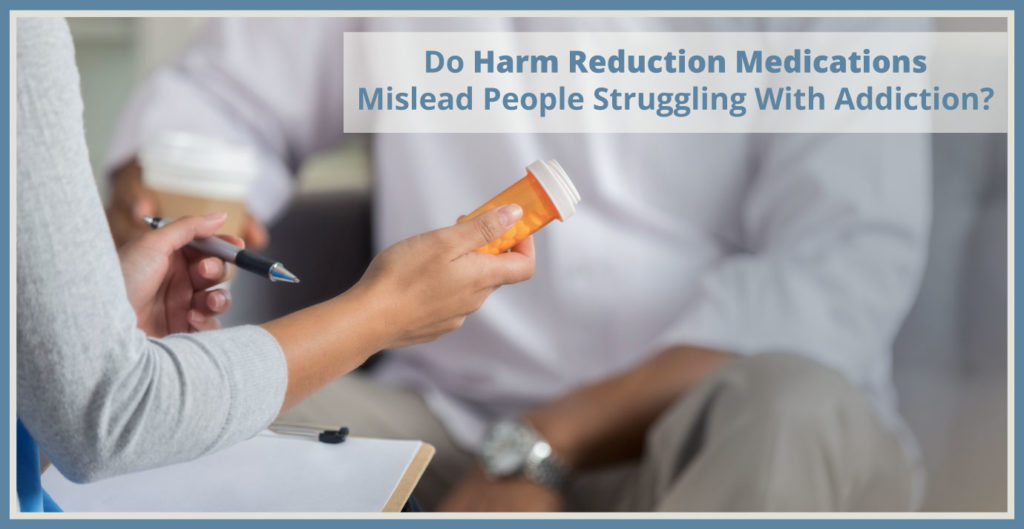Do Harm Reduction Medications Mislead People Struggling With Addiction?
Lorelie Rozzano is a guest blogger for Vertava Health. Karen (not her real name) recently called complaining that her husband’s doctor was handing out methadone like candy. She worried her husband was overmedicated and said despite the methadone, he continued to buy street drugs. Karen is not alone in her experience. When it comes to prescribing for the addicted, don’t expect them to play by the rules. Karen went on to say she believes her husband’s doctor is misleading him. She doesn’t think methadone is as harmless as his doctor says it is. Karen may be right. When it comes to understanding addiction, note that drugs are just a symptom of this disease. If it were just about drugs, then swapping one drug for another might work. But addiction isn’t about what you’re using, or even how much you’re using. It’s about why you’re using. Underlying, undiagnosed and untreated, behavioral, mental health and/or trauma issues may be occurring. Until these issues are identified, healing cannot begin. Karen’s husband approached his doctor two years ago stating he would like to come off heroin. He was then referred to another doctor who is licensed to prescribe methadone. Suboxone and methadone are two medications that are used in harm reduction. These medications decrease the discomfort of the withdrawal process. Opioid users are terrified of detoxing and may use these medications not understanding the withdrawal from them is also a long and painful process. To compare, let’s look at the withdrawal symptoms of all three.
Withdrawal symptoms from heroin:
Mood swings – depression, anger, anxiety and irritability – Nausea and vomiting – Diarrhea and stomach cramps – Aches and pains – especially in the back and legs. Detoxing individuals are more sensitive to pain as their dopamine receptors have been depleted – Excessive bodily fluids – sweat, tears, runny nose- Insomnia – tossing and turning, not able to get comfortable – Restless legs – Drug cravings. Withdrawal symptoms from heroin generally start within 6-12 hours of your last heroin dose. Without the aid of medications, the most uncomfortable time for these withdrawal symptoms is usually 3-4 days after using.
Withdrawal symptoms from methadone:
Muscle aches and pains – Severe nauseous – Vomiting, cramps and diarrhea – Anxiety/panic – due to withdrawal discomfort – Body aches – Chills – Concentration problems – feeling foggy, clouded, trouble swallowing and confused – Chronic depression – due to endorphin levels being much lower than average – Intense Diarrhea – Fatigue – Headaches – Insomnia – not able to sleep for long periods of time – Irritability – lashing out at the people who are trying to help you – Mood swings – feeling extremely depressed and crying, then angry and irritable – Muscle pains – Nausea – Restless legs – unable to keep legs still – Runny nose and eyes – Suicidal thoughts – depression becomes so severe person may feel like they just want it to be over – Sweating -Vomiting – Drug cravings. Withdrawal from methadone generally involves a lengthy detox schedule. It’s almost impossible to stop using methadone cold turkey. The withdrawal symptoms are so intense they make a relapse likely and can be dangerous to the patient’s health. Most people detoxing off methadone will need to gradually lower their dose over a period of time. Some patients find success by taking five fewer milligrams each week, but for other patients, the detox is still too difficult and they need to slow their detox schedule even further. Detox from methadone can take many weeks or even months, depending on the amount being taken.
Withdrawal symptoms from Suboxone:
Nausea – Vomiting – Headaches – Muscle aches – Insomnia – Lethargy – Digestive problems – Anxiety – Depression – Irritability – Drug cravings – Fever – Chills – Sweating – Headache – Difficulties concentrating. Withdrawal symptoms from suboxone are generally at their worst in the first 72 hours. Body aches, pains, insomnia, and mood swings can last up to one week. Depression may continue for two weeks and cravings can last for up to a month after detox. Methadone addiction treatment reports; in a study that compared the withdrawal symptoms of methadone and heroin addicts in a 10 day inpatient detoxification program, the methadone group reported more severe withdrawal symptoms. These methadone withdrawal symptoms were more difficult during both the acute and the recovery phase in comparison to the withdrawal responses in the heroin group. The study, which was conducted at the Drug Dependence Clinical Research and Treatment Unit at Bethlem Royal Hospital, concluded that although there may be reasons to make the case for the use of methadone as a maintenance drug, its use may lead to difficulties during withdrawal. These results are contrary to previous literature that has previously been published regarding methadone withdrawal. Working in a dual diagnosis treatment facility I’ve seen numerous patients come through the door on harm reduction medications. Unfortunately for some, the addicts’ doctors can be their biggest enablers. When this happens, it means no changes in the thinking or behavior of the addicted person, and money in the bank for their doctor. My experience at the Warp Training Australia tells me the withdrawal symptoms from methadone appear to be a more lengthy and difficult detox, than either heroin or Suboxone. It seems there really is no magic pill when becoming abstinent. Although both methadone and Suboxone help decrease withdrawal symptoms, neither medication should be taken for long periods of time. If you decide you want help weaning off opiates and need medications to do so, your best choice is to take them in a structured treatment setting for a short period of time, under strict medical supervision. If you or someone you know needs help, please call this confidential support line for assistance. 844-470-0410.


